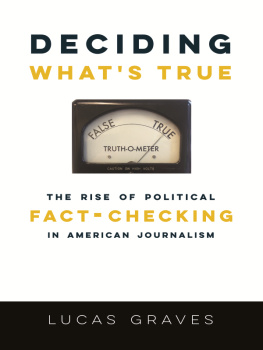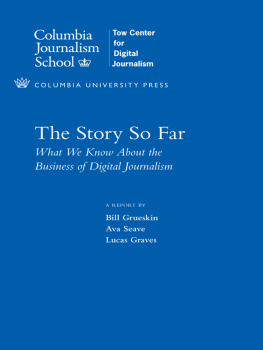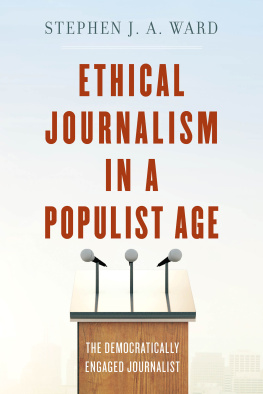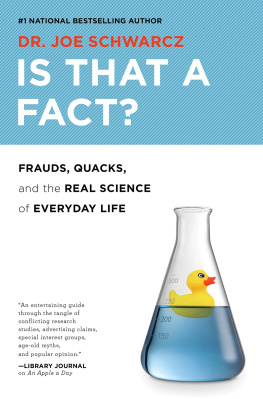Contents
DECIDING WHATS TRUE
DECIDING
WHATS
TRUE
THE RISE OF POLITICAL FACT-CHECKING IN AMERICAN JOURNALISM
LUCAS GRAVES
COLUMBIA UNIVERSITY PRESS New York
COLUMBIA UNIVERSITY PRESS
PUBLISHERS SINCE 1893
NEW YORK CHICHESTER, WEST SUSSEX
CUP.COLUMBIA.EDU
Copyright 2016 Columbia University Press
All rights reserved
E-ISBN 978-0-231-54222-7
Library of Congress Cataloging-in-Publication Data
Names: Graves, Lucas, 1970 author.
Title: Deciding whats true : the rise of political fact-checking in American
journalism / Lucas Graves.
Description: New York : Columbia University Press, [2016] | Includes
bibliographical references and index.
Identifiers: LCCN 2016005306 (print) | LCCN 2016009516 (ebook) |
ISBN 9780231175067 (cloth : alk. paper) | ISBN 9780231175074
(pbk. : alk. paper) | ISBN 9780231542227 (e-book) | ISBN 9780231542227 ()
Subjects: LCSH: JournalismObjectivity. | Journalistic ethics.
Classification: LCC PN4784.O24 G73 2016 (print) | LCC PN4784.O24
(ebook) | DDC 302.23dc23
LC record available at http://lccn.loc.gov/2016005306
A Columbia University Press E-book.
CUP would be pleased to hear about your reading experience with this e-book at .
COVER DESIGN: CHANG JAE LEE
COVER IMAGE : JON GREENBERG
References to websites (URLs) were accurate at the time of writing. Neither the author nor Columbia University Press is responsible for URLs that may have expired or changed since the manuscript was prepared.
CONTENTS
THIS BOOK WOULDNT EXIST WITHOUT THE INDULGENCE OF MANY people, beginning with its protagonists. The exceptional candor and generosity of the fact-checkers and other journalists featured in these pages opened a window onto a new professional world. I owe special thanks to Bill Adair and Angie Drobnic Holan of PolitiFact, Brooks Jackson and Eugene Kiely of FactCheck.org, and Glenn Kessler of the Washington Post.
The research for this book began at Columbia University, where two mentors provided invaluable guidance and support. Michael Schudson was the ideal advisor, patient and wise, always knowing more than he said and saying exactly what was needed. I hope these chapters reflect the influence of his unusually graceful way of thinking. David Stark never failed to ask the question that cast everything in a new light; his interest, advice, and sharp eye were an enormous asset. I also benefited from the incisive comments and questions of Todd Gitlin, Victor Pickard, and Stephen Reese, and of Herb Gans, who volunteered to read the final product. All of these thoughtful critiques helped greatly to carry the project forward.
At Columbia I received valuable support in David Starks CODES seminar and from many friends in the Sociology Department, which became a second home; thanks especially to Monique Girard and Josh Whitford. On the remarkable faculty in our small, boundary-crossing Communications Program, I owe special thanks to Andie Tucher and Frank Moretti, whose confidence made all the difference early on. Frank had a wide embrace and he is missed by all of us. Chris Anderson, Jonah Bossewitch, Laura Forlano, Tom Glaisyer, Phil Kay, John Kelly, Rasmus Kleis Nielsen, Ruth Palmer, Ben Peters, Soomin Seo, Julia Sonnevend, Olivier Sylvain, Madiha Tahir, and Joost van Dreunen were valued comrades in and out of the J-school basement.
A number of organizations have supported this project directly or indirectly. Funds for research, travel, and writing came from the Poynter Institute, the Open Society Foundations, the Democracy Fund, the Omidyar Network, the Wisconsin Alumni Research Foundation, and the Mellon Graduate Fellows program at the Institute for Social and Economic Research and Policy. A fellowship with the New America Foundation in Washington, DC, provided crucial support at an early stage; Im indebted to Steve Coll and Tom Glaisyer for their interest. Special thanks also go to Tom Rosenstiel, Jane Elizabeth, and Jeff Sonderman at the American Press Institute in Reston, Virginia, whose engagement has been vital for researchers who study fact-checking. In that community Ive benefited from conversations and collaboration with Brendan Nyhan, Jason Reifler, Michelle Amazeen, Emily Thorson, Ashley Muddiman, and Talia Stroud.
An army of friends in New York and Madison read parts of this book at various stages. Peter Asaro, Chris Anderson, Katherine Brown, Emily Callaci, Kathryn Ciancia, Biella Coleman, Judd Kinzley, Nicole Nelson, Ruth Palmer, Laura Portwood-Stacer, Sue Robinson, Annie Rudd, Julia Sonnevend, Molly Wright Steenson, and Stephen Young all gave valuable feedback on chapter drafts. Christina Dunbar-Hester influenced this undertaking from start to finish and was always ready with a raised eyebrow when I needed it most. My editor at Columbia University Press, Philip Leventhal, has been a calm and sure guide; thanks also to Miriam Grossman. Patti Bower and Michael Haskell performed remarkable feats of copyediting. I owe a tremendous debt to two anonymous reviewers and to my friend Rasmus Kleis Nielsen for their incisive and thoughtful comments on the final draft. This book is far better as a result.
Many others aided and abetted this work at various points. My colleagues in the School of Journalism and Mass Communication at UWMadison helped in ways great and small; thanks especially to Sue Robinson, Lew Friedland, Shawnika Hull, Al Gunther, and the late, extraordinary James L. Baughman. Jessica Faule, Rich Garella, Omar Serageldin, Ranjit Singh, and Alix Burns put me up (and put up with me) during numerous research trips. Ingrid Erickson lent me her apartment in Harlem. Meghan Chua and Caitlin Cieslik-Miskimen assisted ably with editing, research, and transcription. Kate Fink and Patrice Kohl handled successive versions of the content analysis in . Patricia Connelly offered to copyedit the whole thing one Christmas, and then did it. My mother, Janice Olson, lent her editing and design talents, her reassuringly strong views, and her unflagging support. Anjali Bhasin was patient, cheerful, and wise. Molly Steenson and Emily Callaci commiserated often and well.
Ive been lucky throughout to be surrounded by an extended family thats close by even when Im notPatricia, Jessie, Alan, Greta, Mardi, the Olsons, and most of all my parents, Dave and Jan. This is for them.
In memory of Michael Graves.
A Brazen Lie?
THE 2012 U.S. PRESIDENTIAL RACE ENDED ACCORDING TO THE forecast, with a decisive victory for Barack Obama. But the closing days did bring one unusual development: the most emphatic collective debunking of a major campaign claim in the modern history of American journalism. The episode presaged what would be ubiquitous political fact-checking in the primaries four years later, when reporters instincts were sharpened by unusually wild rhetoric from several political outsidersin particular a famous real estate mogul and reality TV star. In hindsight, it was all the more remarkable for centering on a comparatively mild campaign claim from the consummate establishment candidate.
Romneys new attack ad, called Who Will Do More?, seized on a news bulletin out of Detroit to cast the governments role in a different light. Over images of old sedans being flattened by an industrial press, a male voice offered a harsh appraisal of the White Houses record: Obama took GM and Chrysler into bankruptcy and sold Chrysler to the Italians, who are going to build Jeeps in China. As evidence for the last point, the ad flashed an out-of-context excerpt from a recent financial news item reporting that Chrysler plans to return Jeep output to China.







